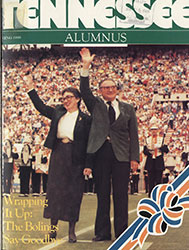Dr. Edward J. Boling served as president of the University of Tennessee from 1970-1988. After his retirement, Dr. Boling continued to serve the University as president emeritus and was tasked with maintaining and building relationships among UT supporters.
A native of Sevier County, Dr. Boling was born on Feb. 19, 1922. He passed away on June 18, 2015.
Dr. Boling’s UT life began when he made a snap decision one morning to register for classes after working the night shift at ALCOA as an accountant. His freshman year was interrupted in April 1943 when he was called to active duty in the Army.
Following World War II, Dr. Boling returned to UT and finished his degree thanks to the G.I. Bill. He held several jobs, including teaching statistics at UT, before working in state government. He was recruited back to UT by then-President Andy Holt in 1961 to be vice president for development and administration.
Upon his retirement in 1988, Dr. Boling was interviewed by the Tennessee Alumnus magazine. Here are some excerpts of his interview:

“Dr. Holt always said, ‘The state is our campus.’ He wanted people to feel the University belonged to the state, and we still do. We want people to like the University and believe in what we do.”
“I have tried as president to follow a creed I learned from my folks: be as honest as you can in everything you do, sometimes direct to the point that it hurts. But don’t let anybody misunderstand you. If you’re straight with people, you can sleep at night.”
“As president, you do almost nothing on your own. You have to convince people who run the programs to go along with you. You can’t demand it.”
“If people look at my years as vice president as well as president, I would probably be seen as a builder because I was responsible for the building program under Dr. Holt. As president, I think I’ll be remembered as a hard-nosed administrator. That’s the way I’ve been painted all these years. But I’ve also sat long hours and listened to students, faculty members and other groups. I hope people will see the progress we’ve made by listening and working together.”